Refining colorectal cancer classification and clinical stratification through a single-cell atlas
- PMID: 35538548
- PMCID: PMC9092724
- DOI: 10.1186/s13059-022-02677-z
Refining colorectal cancer classification and clinical stratification through a single-cell atlas
Erratum in
-
Correction: Refining colorectal cancer classification and clinical stratification through a single-cell atlas.Genome Biol. 2022 Jul 13;23(1):156. doi: 10.1186/s13059-022-02724-9. Genome Biol. 2022. PMID: 35831907 Free PMC article. No abstract available.
Abstract
Background: Colorectal cancer (CRC) consensus molecular subtypes (CMS) have different immunological, stromal cell, and clinicopathological characteristics. Single-cell characterization of CMS subtype tumor microenvironments is required to elucidate mechanisms of tumor and stroma cell contributions to pathogenesis which may advance subtype-specific therapeutic development. We interrogate racially diverse human CRC samples and analyze multiple independent external cohorts for a total of 487,829 single cells enabling high-resolution depiction of the cellular diversity and heterogeneity within the tumor and microenvironmental cells.
Results: Tumor cells recapitulate individual CMS subgroups yet exhibit significant intratumoral CMS heterogeneity. Both CMS1 microsatellite instability (MSI-H) CRCs and microsatellite stable (MSS) CRC demonstrate similar pathway activations at the tumor epithelial level. However, CD8+ cytotoxic T cell phenotype infiltration in MSI-H CRCs may explain why these tumors respond to immune checkpoint inhibitors. Cellular transcriptomic profiles in CRC exist in a tumor immune stromal continuum in contrast to discrete subtypes proposed by studies utilizing bulk transcriptomics. We note a dichotomy in tumor microenvironments across CMS subgroups exists by which patients with high cancer-associated fibroblasts (CAFs) and C1Q+TAM content exhibit poor outcomes, providing a higher level of personalization and precision than would distinct subtypes. Additionally, we discover CAF subtypes known to be associated with immunotherapy resistance.
Conclusions: Distinct CAFs and C1Q+ TAMs are sufficient to explain CMS predictive ability and a simpler signature based on these cellular phenotypes could stratify CRC patient prognosis with greater precision. Therapeutically targeting specific CAF subtypes and C1Q + TAMs may promote immunotherapy responses in CRC patients.
Keywords: CMS classification; Cancer-associated fibroblast; Colorectal cancer; Immunotherapy; Single-cell analysis; Stromal signatures.
© 2022. The Author(s).
Conflict of interest statement
Ashiq Masood and Jeffrey A. Borgia received research funding from Tempus lab. Anjuraj Sadanandam receives research funding from Bristol-Myers Squibb; Merck KGaA, Pierre Fabre. Furthermore, Anjuraj Sadanandam. holds patent PCT/IB2013/060416, “Colorectal cancer classification with differential prognosis and personalized therapeutic responses,” and patent number 2011213.2 “Prognostic and Treatment Response Predictive Method.”
Figures
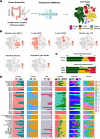
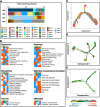
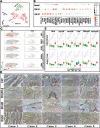
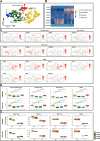



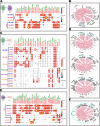
References
-
- Molinari C, Marisi G, Passardi A, Matteucci L, De Maio G, Ulivi P. Heterogeneity in colorectal cancer: a challenge for personalized medicine? Int J Mol Sci. 2018;19 Available from: https://www.ncbi.nlm.nih.gov/pmc/articles/PMC6321493/. Cited 2020 Dec 29. - PMC - PubMed
Publication types
MeSH terms
Substances
Grants and funding
LinkOut - more resources
Full Text Sources
Medical
Molecular Biology Databases
Research Materials

